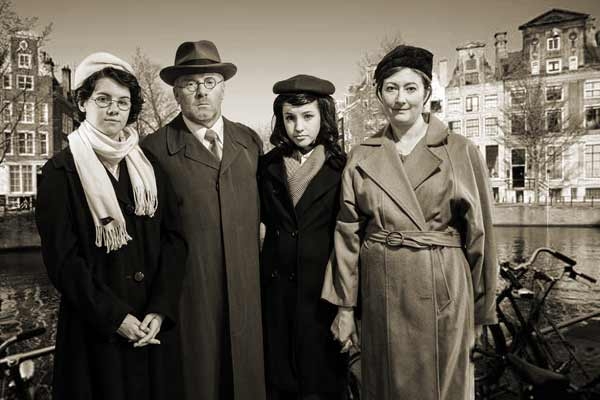Across the planet, people are desperately seeking refuge from homeland oppression in numbers not seen since the Second World War.
The response from global leaders has been mixed, ranging from the compassion of Germany’s Angela Merkel to the overt xenophobia of Donald Trump.
Geoff Brittain, Director of The Adelaide Repertory Theatre’s ‘The Diary of Anne Frank’ explains why his production sadly resonates now more than ever.
In a modern world where millions are fleeing persecution, this play is as important as ever. What message do you want audiences to take away from the production?
Those who care about never again repeating what happened to Anne Frank, when we look at Muslim bans and we look at Syrian refugees, we must save every future Anne Frank that we didn’t save decades ago. That’s why, in the name of Anne Frank, we have an obligation to stand with all refugees to help them. Anne Frank believes that “in spite of everything, everyone is truly good at heart”.
Do you think her story has persevered in part because of this heroic optimism in the face of oppression?
Yes, I do, though of course this phrase has always been taken out of context because of how it is used in the play. I don’t believe it is 'heroic optimism' but rather a young girl trying to make sense of her faith and the world she lived in. She had to have optimism as she believed it impossible to build a life on a foundation of chaos, suffering and death. The first rendition of the play by Meyer Levin, a Jewish newspaper reporter, contained a much deeper relationship between Anne and Peter Van Dann. Because of their situation, Anne had come to understand her Jewish faith and belief in God as a moral force to her survival. Peter, on the other hand, came to resent his Jewishness and Anne used this phrase in conversation with him to find meaning in her experience of the Holocaust. The Hackett version of the script (the Broadway version) removed most of the Jewishness from the play and this phrase became the cornerstone of the play’s ultimate message. Legal reasons prevent Levin’s script from ever being produced and is not available for production.
Henny Walters plays Anne in your production; what has she brought to the role?
Firstly, Henny is a very talented young actor, she has researched her role and understands what I am trying to get from her in this production. Henny is the same age as Anne was at the end of her confinement and she brings that innocence and bravado of youth to the role. Most productions of this play (both stage and screen) tend to use older actors in the role, Henny is the same age as Anne was at the end of her confinement and she brings that innocence and bravado of youth to the role. Anne was by no means a saint, she had trouble getting along with her mother and like most young people did not always understand grown-ups. Henny has made Anne a real girl of her times, loud, passionate, naïve, rude and active. For you, directing is about “wrestling with the whole story in minute detail”.
With this production, what steps have you taken to deliver an authentic representation of the story?
I have researched the real-life characters in the play, and keeping in mind that for artistic reasons the play's portrayal of them is not always accurate, for example, Mr Van Dann did not steal food and the end of Act One did not end as a joyous family occasion. I have encouraged the actors to step outside of the script's portrayal and introduce some of the real-life elements to their performances, while being careful not to step outside copyright laws. These things were added to make the story more palatable to a 1950s Non-Jewish American audience. I have tried to impress upon the cast the times that their characters were living in. I have also spent a great deal of time with our set designer, Ole Wiebkin to try and make the setting as authentic as possible. The original house had three floors, an attic and many small rooms which we cannot replicate on stage, however, we have tried to recreate the “living on top of each other” effect to enable the actors to feel the tension and closeness of living in a very cramped, non-private situation.
The production has a rich history; have you taken inspiration from any previous incarnations?
No. I tend not to look at other productions of the play. I prefer, with a true story, to research the facts of the situation and the characters involved, then spend time with the actors discussing how we plan to present them on stage. So, it becomes a collaborative effort with everyone on the same page. It is always better to find a fresh interpretation of a story rather than replaying something that’s been done before.






